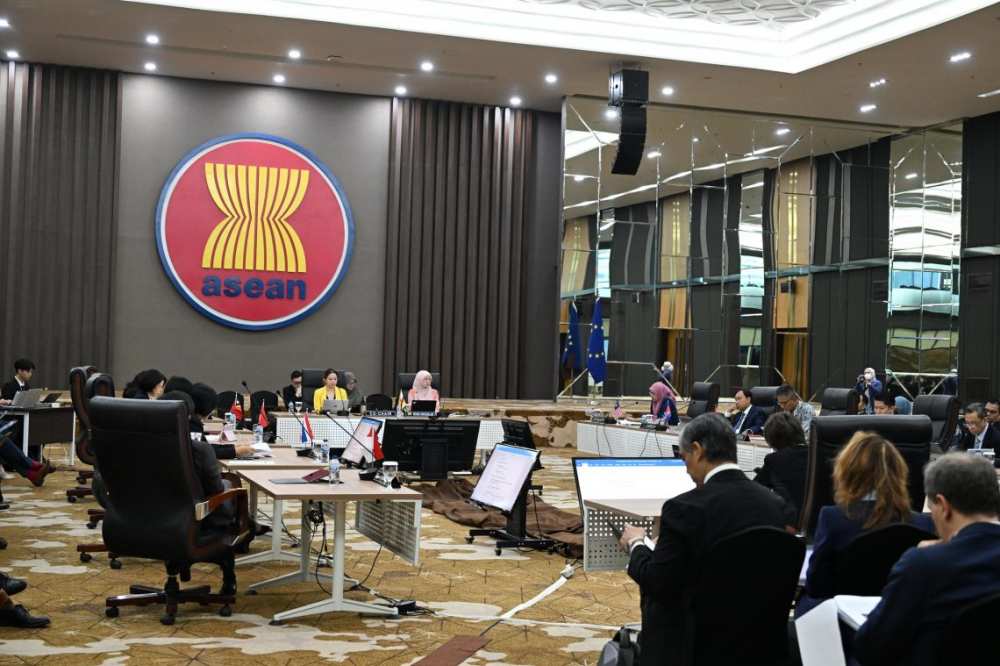Jakarta, June 16 (AseanAll) — The Association of Southeast Asian Nations (ASEAN) and the European Union (EU) held their 32nd Joint Cooperation Committee (JCC) Meeting on Monday, 16 June 2025 in Jakarta, Republic of Indonesia.

The two sides reviewed recent developments in their respective regions since the last JCC Meeting held on 8 May 2024, including the challenging global geopolitical context. The two sides reaffirmed their shared commitment to strengthening the rules-based multilateral system through the promotion of effective multilateralism, as well as to respecting and promoting international law and international norms and standards. They reiterated their shared commitment to support ASEAN Centrality and ASEAN-led mechanisms. They confirmed their shared determination to promote peace, security, and stability and prosperity, including through the four priority areas of the ASEAN Outlook on the Indo-Pacific (AOIP) and the seven priority areas of the EU Strategy for Cooperation in the Indo-Pacific, and the protection of human rights and fundamental freedoms.
ASEAN and the EU took stock of their extensive cooperation and explored ways to reinforce their strategic partnership, with a view to improving the security and the quality of life of their citizens, increase connectivity between the two regions, and respond to global challenges. The two sides reviewed the implementation of the Plan of Action to Implement the ASEAN-EU Strategic Partnership (2023-2027), welcoming the progress achieved since their previous meeting, with 61% percent of action lines addressed.
The two sides welcomed the ongoing roll-out of the EU’s Global Gateway, including the implementation of Sustainable Connectivity and the Green Team Europe Initiatives. They expressed their pleasure that all projects under the EU-ASEAN Sustainable Connectivity Package (SCOPE) were now operational, spanning trade, people-to-people connectivity, transport, energy, and digital connectivity. The EU expressed its intention to scale up support for the ASEAN Power Grid, drawing on its experience with energy market integration within the EU. ASEAN also encouraged the EU to actively support the ASEAN Connectivity Strategic Plan (ACSP).
ASEAN and the EU discussed their cooperation in the field of peace and security, including through the ASEAN Regional Forum (ARF). They underscored the importance of strengthening their cooperation in cybersecurity and on maritime security, including through the ASEAN-EU High-Level Dialogue on Maritime Security Cooperation.
The two sides discussed their cooperation on trade and economic issues, focusing in the short and medium term on areas of mutual interest including the digital economy, green technologies and green services, and supply chain resilience, while also reaffirming their intention to pursue more concrete sectoral cooperation in areas of mutual interest as building blocks toward an eventual ASEAN-EU Free Trade Agreement (FTA). They welcomed the ongoing work of the ASEAN-EU Joint Working Group for Trade and Investment, and looked forward to the 21st ASEAN Economic Ministers-EU Trade Commissioner Consultation in September 2025, as well as the launch of the SCOPE Trade project in the coming months. They also recognised the importance of a predictable, transparent, free, fair, inclusive, sustainable and rules-based multilateral trading system, with the World Trade Organisation (WTO) at its core.
They looked forward to the convening of the Fourth Joint Working Group on Palm Oil between the European Union and Relevant ASEAN Member States to continue promoting mutual understanding on the sustainable production of vegetable oils and addressing the challenges in this sector in a holistic, transparent, and non-discriminatory manner.
ASEAN and the EU discussed their cooperation on socio-cultural issues, reiterating their commitment to promoting sustainable development and addressing the global challenges of climate change, biodiversity loss and environmental protection. They also underlined their shared interest in further engagement in the field of Disaster Management and Emergency Response, notably between the ASEAN Coordinating Centre for Humanitarian Assistance on Disaster Management (AHA Centre) and the EU’s Emergency Response Coordination Centre (ERCC).
ASEAN welcomed the EU’s contributions towards ASEAN Community-building and regional integration efforts, and called on the EU to continue its support for the implementation of the ASEAN 2045: Our Shared Future, as well as ASEAN’s efforts to narrow the development gap through the Initiative for ASEAN Integration (IAI).
The meeting was co-chaired by Ambassador Latifah Zaini, Permanent Representative of Brunei Darussalam to ASEAN, and by Ms. Leila Fernández Stembridge, Head of the South-East Asia Division of the European External Action Service, together with Mr. Mario Ronconi, Head of Unit for South and South-East Asia, European Commission Directorate-General for International Partnerships. It was attended by members of the Committee of Permanent Representatives to ASEAN and officials from the EU institutions, as well as officials from the ASEAN Secretariat. EU Member States, Timor-Leste, and the European Investment Bank also attended the meeting as observers.